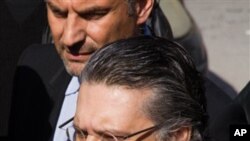The non-governmental press freedom advocacy group, Freedom House, noted that Tunisia, the cradle of the Arab Spring, made “dramatic gains in press freedom.” In fact, the country’s new government had removed restrictions on long-denied freedoms of the press and expression, unblocking internet websites, allowing journalists to work freely.
This year, Tunisia hosted the UNESCO World Press Freedom Conference. But even as Tunis prepared to celebrate one of the core pillars of democracy, its courts made a crucial decision with regard to another central tenet of democracy: freedom of expression.
Nabil Karoui the owner of independent Nessma TV, was on trial for deciding to air the animated movie “Persepolis.” The movie includes a short sequence whereby the main character imagines herself talking to God, who appears as a bearded old man.
This scene offended hard-line Islamists, who demolished Mr. Karoui’s home and demanded his death. His defenders, on the other hand, wondered why Mr. Karoui was even on trial, since whether the movie is offensive is a matter of opinion. Moreover, the movie had previously been approved for airing by the Tunisian Broadcasting Board of Governors.
The court found Mr. Karoui guilty of violating public morals and disturbing public order and fined him 2,400 Tunisian Dinars, about $1,500 U.S.
This case sets a dangerous precedent for the new democracies of the Middle East. By finding that Mr. Karoui’s choice to air previously-approved material on a privately-owned media outlet, however potentially offensive to some, constituted a legal violation, the Tunisian court’s decision had the effect of censorship.
Thomas Jefferson, one of the founding fathers of the United States whose most important work, the Declaration of Independence has influenced democratic movements the world over, wrote on the necessity of unrestricted public discourse, stating that “self-government, freedom of speech, freedom of conscience, and freedom of the press ... [are] inextricably bound together into a single system, and they would stand, or fall, together.”
“[Mr. Karoui’s] conviction raises serious concerns about tolerance and freedom of expression in the new Tunisia,” said Assistant Secretary of State Esther Brimmer during her opening speech at the UNESCO celebration in Tunis. “I understand that Mr. Karoui has the right to appeal his conviction, and hope that mechanism will result in a clear endorsement of the right to free expression.”
A Question Of Freedom Of Expression

As Tunis prepared to celebrate one of the core pillars of democracy, its courts made a crucial decision with regard to another central tenet.



